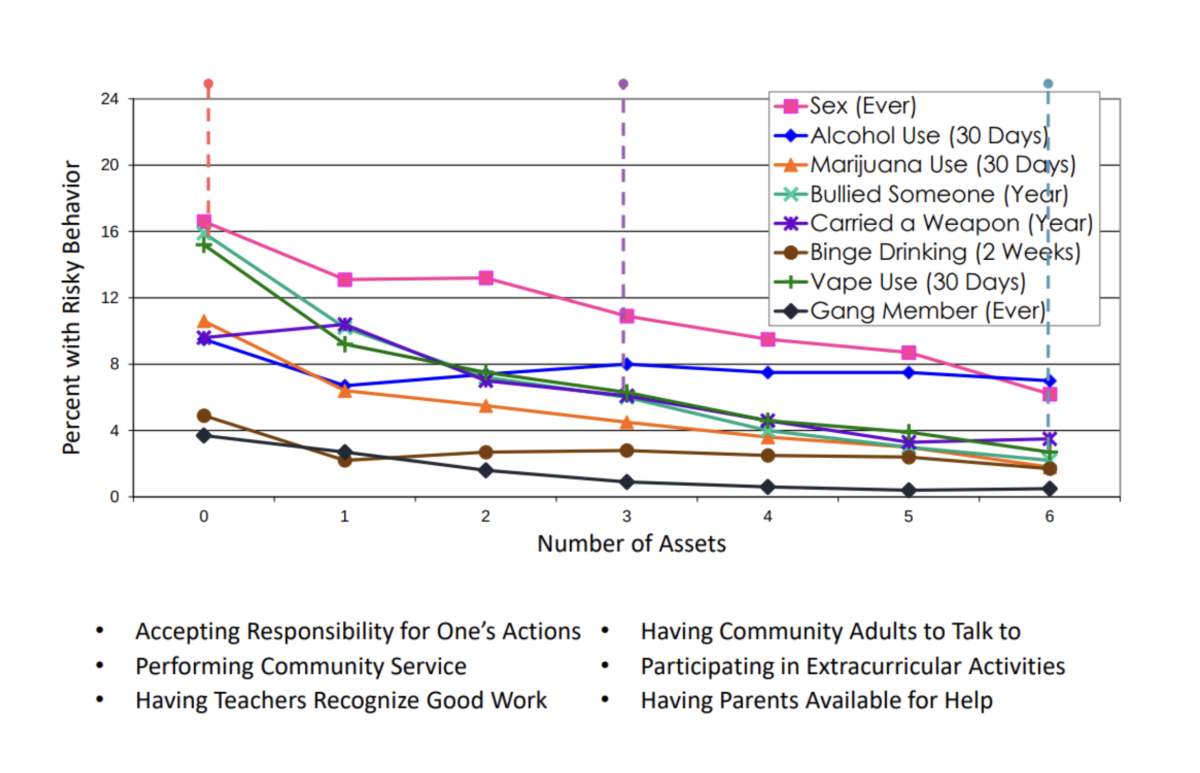Have you ever smoked? Do you have a trusted adult? How much time do you spend on homework? These questions may sound familiar from one of the many youth surveys from Fairfax County Public Schools (FCPS). Every year, FCPS mandates that students take an anonymous survey that covers their mental, physical and social health, among other critical topics. FCPS then uses the responses to identify trends in student health and address the most prevalent issues the student body faces.
“[The survey] helps to give us a sense of what adolescent behavior looks like in the high schools across the county, [and has] really specific data about what McLean students said [and] how we fare in relation to the schools,” school psychologist Carol Ann Forrest said. “We use it to really begin to get an understanding of what are the general trends among high school students in the county.”
While the survey covers over 26 topics in detail, substance use, risky behaviors, mental wellness and time management are the focal points of the survey. The latest survey shows modest improvement in most of these areas.
“There is a trend towards some improvement,” Forrest said. “There’s slightly less substance use, sexual activity, aggression and delinquent behavior. There’s also less anxiety… and suicide attempts than were previously reported in the previous year.”
Just 29% of students reported that they felt sad or hopeless over the past year, a 9% decrease from two years ago. The downward trends in depression are likely due to an uptick in social health following the end of COVID-19 pandemic shutdowns. Stringent quarantine policies deteriorated mental health in early 2020, as students found themselves without any contact with their peers.
“Students were worse emotionally in the past years due to social isolation and the constant threat to our lives and our loved ones, which heightened feelings of anxiety and depression,” said Ariyana Hashemi, founder of McLean Minds Matter, the school chapter of the national mental health organization Our Minds Matter, three years ago. “Not to mention, the transition to quarantine happened so suddenly that it didn’t give us time to process everything emotionally.”
According to research conducted by the World Health Organization, COVID-19 caused a 25% increase in depression and anxiety globally. Adolescents were one of the groups that demonstrated the most significant increase in mental illnesses, seeing as social contact is essential during the time when the brain is still fully developing. It was not until the pandemic waned in influence that overall mental health rebounded to pre-pandemic levels.
“I have noticed some improvement within my time at McLean; as we transition to more traditional schooling again, people are able to gather with their friends and interact within clubs,” said junior Emory-Jaxon Cartwright, president of the Our Minds Matter club. “This connection is very important for mental health, and it has greatly contributed to Highlanders’ mental health.”
Furthermore, data from the youth survey shows that substance use has been declining over the past decade. According to one graph published in the youth survey highlights, the percentage of students who used alcohol dropped from about 15% in 2019 to about 7.5% in 2022.
“FCPS spends time educating students on drug abuse and its consequences, though they could do better at this,” Cartwright said. “[Regardless,] the effort is commendable.”
Other issues have also echoed the downward trend of substance abuse. Bullying, cyberbullying, and race-related harassment have all seen modest decreases by at least a few percentage points. Regardless, Cartwright believes that FCPS could do more to improve mental wellness in its student body.
“FCPS needs to do a better job at protecting its disabled students and their mental health, through promoting the puzzle piece for autism they promote a hateful ideology that autistic people are missing a part of them,” Cartwright said. “FCPS also needs to increase their efforts to prevent bullying, ableism, racism and homophobia. I witness these events often and teachers are not trained on how to handle these situations and so these aggressions often go unpunished.”
Concerns of mental health are echoed with substance abuse. Even though substance abuse dramatically decreased, students still believe that FCPS is capable of further extending their awareness campaigns.
“As a student myself, I know most students don’t take the educational lessons they deliver during [Highlander Time] seriously — that’s why I believe schools should put an emphasis on resources available to students and work on addressing the causes related to drug abuse rather than ‘educating’ students on the bad effects of nicotine/etc,” Hashemi said.
The psychology team, including Forrest, agrees that FCPS could do more to improve student’s mental and physical wellbeing. Forrest argues that FCPS should encourage students to balance their schedules better.
“As a whole, we need to continue to help students learn to balance academic pressure with mental health. Here at McLean, we have a culture of very high-achieving students,” Forrest said. “There is sometimes an imbalance, where students will focus on academic achievement without really taking enough time to consider whether or not that’s really good for their mental health.”
The Student Services Department ultimately finds the youth survey to be an accurate, useful indicator of student wellness, though there is room for improvement.
“When we have data that supports and helps us understand what the trends are, then we can focus on where we need to put resources,” Forrest said. “[Overall,] the youth survey is very helpful [and] very informative.”
FCPS Youth Survey shows improvement in student mental health
Newly released report show decline in substance use and depression rates

Gallery • 3 Photos
Donate to The Highlander
$335
$1000
Contributed
Our Goal
Your donation supports the McLean High School's independent, award-winning news publication.
More to Discover














